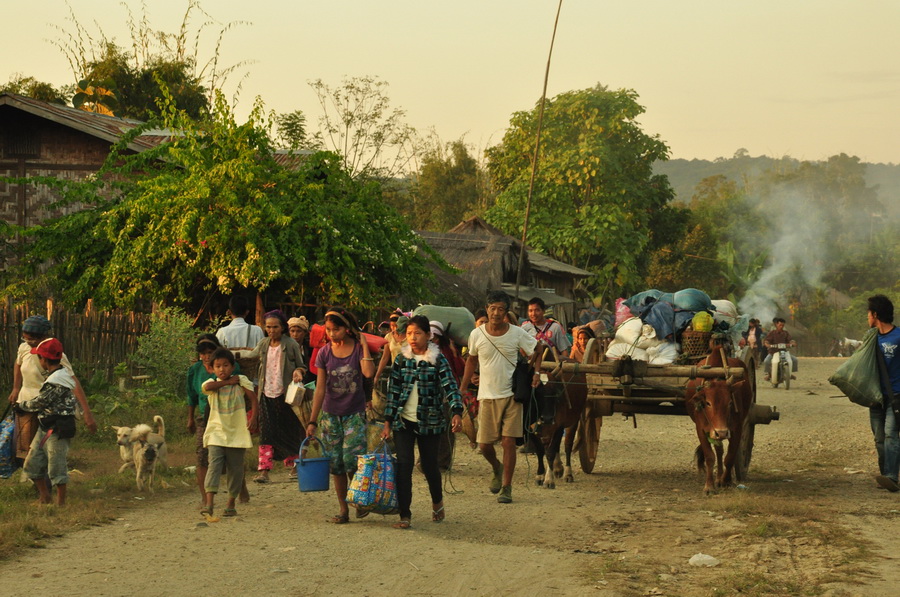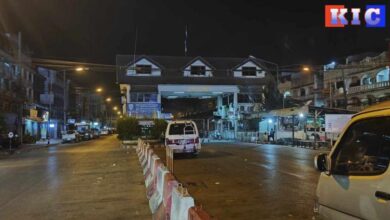China forces Kachin refugees back to Burma

Human Rights Watch warns that thousands of ethnic Kachin fleeing war in Burma are at risk of abuses, food shortages and conflict China should stop the forced return of thousands of ethnic Kachin refugees to northern Burma, where they are at risk from “armed hostilities, Burmese Army abuses, and lack of aid,” Human Rights Watch said in a media statement released on the 24th of August.
Ethnic conflict erupted in Burma’s northern Kachin State in June last year, shattering a 17-year ceasefire agreement between Burma’s government and the Kachin Independence Organization (KIO) and it’s armed forces, the Kachin Independence Army (KIA).
Human Rights Watch documented how since the Kachin war started, the Burma Army has attacked Kachin villages, razed homes, and pillaged properties. Burmese soldiers have threatened and tortured civilians during interrogations, raped Kachin women, used antipersonnel mines, and conscripted forced laborers on the front lines, including young children.
Commentators and international NGO’s alike have attributed the conflict to President U Thein Sein’s government’s push for massive hydroelectric dam projects in Kachin State, which would have displaced tens of thousands of Kachin living nearby.
Human Rights Watch alleges that during the week of August 19, 2012, Chinese authorities forcibly returned at least 1,000 Kachin refugees to Burma and that a further 4,000 could be deported in the coming days.
Most of the returnees will find it too dangerous to return to their home villages, leaving them displaced amid an armed conflict in Burma, Human Rights Watch said.
China is flouting its international legal obligations by forcibly returning Kachin refugees to an active conflict zone rife with Burmese army abuses,” according to Bill Frelick, director of the Refugee Program at Human Rights Watch. “China should urgently change course and provide temporary protection for the refugees in Yunnan Province.”
While the Chinese government has provided sanctuary to an estimated 7,000 to 10,000 Kachin who fled conflict-related abuses in Burma and sought safety in Yunnan Province, the authorities have failed to provide them temporary protection or aid. The Chinese government has denied United Nations and international humanitarian agencies much-needed access to these refugees.
Most of the refugees had fled wartime abuses in Burma such as forced labor, killings, rape, and torture by the Burma Army, or the threat of abuses. There are over 85 camps of internally displaced people in Kachin State, housing an estimated 75,000 people, who lack adequate humanitarian aid. Approximately 16 of the camps, in KIO-controlled areas, are already home to at least 55,000 Kachin, and there are food shortages at some of those sites.
All camps in KIO territory are inaccessible to UN agencies because of restrictions imposed by President Thein Sein’s office under the pretense of security concerns, Human Rights Watch said.
Assistance from UN agencies and other humanitarian organizations is provided regularly to displaced Kachin in 70 locations in government-controlled areas, but that too remains inadequate due to limited resources and the blockage of assistance.
“Adding thousands more Kachin to the camps in Burma will only compound the crisis for internally displaced people in Kachin State,” Frelick said. “President Thein Sein urgently needs to let the aid agencies reach everyone who needs their help.”
Meanwhile HRW’s allegations have been confirmed by local Kachin groups who have also accused Chinese authorities of forcibly returning 732 Kachin refugees on Thursday 23rd of August.
Kachin sources have accused Chinese authorities of forcing back refugees back into conflict-zones. “Kachin refugees in Man Hai faced force to return to war zone in the KIA’s 4th Bridge areas [Northern Shan State].” Kachin sources stated.
“Local Chinese police officers were escorting and guarding along the borders whilst forced relocation have started this morning. The Chinese police have also arrested the journalists who took the photographs and confiscated their cameras.” They added.
China is a party to the 1951 refugee convention and its 1967 protocol that prohibit the forced return “in any manner whatsoever” of refugees to places where their “life or freedom” would be threatened on account of their “race, religion, nationality, membership of a particular social or political opinion.”




